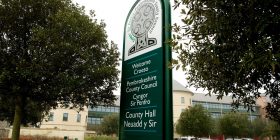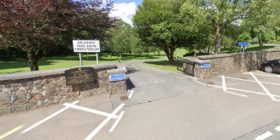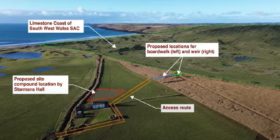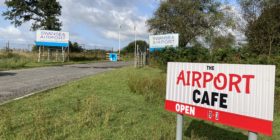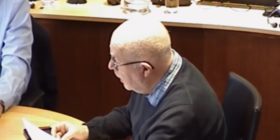Low carbon energy: Swansea event boosts expert collaboration

New joint ventures in low-carbon energy look set to emerge from a very successful expert symposium, hosted by the Energy Safety Research Institute at Swansea University, which brought together experts in the field from across the UK and overseas.
The event, called “Building New Bridges for Low Carbon Energy”, aimed to establish new collaborative links between experts in areas such as biomass and carbon dioxide capture and utilisation.
Around sixty experts took part, including academic researchers in the field, PhD students, and representatives from Tata Steel and Natural Resources Wales.
The event was an opportunity for attendees (pictured) to showcase their research and to establish new links and collaborations within Wales and beyond.
Potential areas for future collaboration include:
• CO2 utilisation – and new ways of using existing research in the field being carried out at Cardiff University
• The use of supercritical CO2 – carbon dioxide in a fluid state – as a green process solvent, using technology and expertise from Bangor University.

Dr Enrico Andreoli from the Energy Safety Research Institute at Swansea University said:
“The ESRI Low Carbon Energy symposium was a great success. We had outstanding talks about CO2 utilisation from Professor Nora de Leeuw of Cardiff University, and about green chemistry and biomass utilisation from Patricia Thornley, Professor in Sustainable Energy Systems from The University of Manchester.
All other speakers and poster presenters did a fantastic job too. I’m very grateful to them all and to the organising committee who worked really hard to make it a success.
This was the first symposium for ESRI and for the newly-built Swansea University Bay Campus – we are really honoured to have had the opportunity to be the first.”
The Organising Committee at Swansea, Cardiff and Aberystwyth universities for the event were: Dr Enrico Andreoli, Dr Sankar Meenakshisundaram, Dr Gordon Allison, Dr Ewa Nowicka, Dr Alberto Roldan Martinez, and Dr Covadonga Correas.

Dr Dion Curry of the Department of Political and Cultural Studies at Swansea University said:
“The Low Carbon Energy Symposium was an excellent opportunity for me to discover the technical issues and solutions associated with alternative energy in Wales and the UK.
As a social scientist interested in public policy, the symposium provided key insights into the scientific side of low carbon energy and the needs and goals of experts in the field.
Most importantly, the symposium helped to spark debate on a wide range of issues and has already provided me with opportunities for fostering cross-disciplinary collaborative projects with the other participants.”
Professor Steven Kelly of Swansea University Medical School, an expert in biofuels and biorefining, said:
“Biorenewable sources of fuels and chemicals are a central part of the low carbon agenda. In the European Regional Development Fund project, BEACON research into Sustainability was awarded the EU Regiostars prize in 2014.
The joint project with Aberystwyth and Bangor Universities has just moved to a new phase and the ESRI meeting on the new Bay Campus was a good opportunity to network. Going forward this will help develop new research and development and help the companies we interact with.”
Financial support was provided by the Welsh Government and Higher Education Funding Council for Wales through the Sêr Cymru National Research Network for Low Carbon, Energy and Environment.
Spotted something? Got a story? Email News@News.Wales






